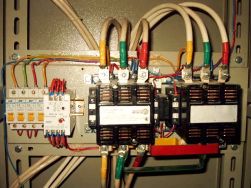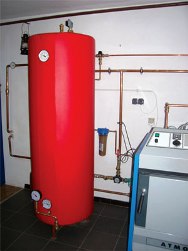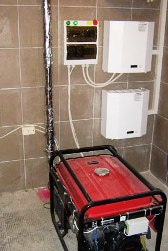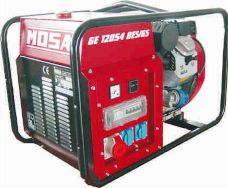Categories: Sharing experience, Electrician at home, Autonomous power supply
Number of views: 71937
Comments on the article: 3
Autonomous power supply at home
 The problem with electricity in our homes has become, unfortunately, already commonplace. They can turn off electricity quite unexpectedly, without any warning. And imagine such a situation ...
The problem with electricity in our homes has become, unfortunately, already commonplace. They can turn off electricity quite unexpectedly, without any warning. And imagine such a situation ...
Winter. On the street, frost is under - 20, you go home, the snow crunches under your feet ... Come home, and there ... it's dark, the house is cool, uncomfortable ... And then you recall that for the normal, constant operation of your gas boiler, a constant, uninterrupted power supply is required.
In this short article, we will try to figure out how to avoid situations, so as not to be left without heat, so that your boiler functions at five plus.
So, if you have autonomous heating, then already at the stage of installation work it was necessary to provide for autonomous energy supply of the most important sections of your house. The heating system is without a doubt the number one on this list.
 If you are the lucky owners of a private house, to ensure uninterrupted power to the heating system, you can between the UPS on batteries and the gas or diesel generator. You decide. Consider the advantages and disadvantages of these alternative sources of electrical energy for autonomous power supply at home.
If you are the lucky owners of a private house, to ensure uninterrupted power to the heating system, you can between the UPS on batteries and the gas or diesel generator. You decide. Consider the advantages and disadvantages of these alternative sources of electrical energy for autonomous power supply at home.
Start with Uninterruptible Power Supply (UPS).
1) + The UPS does not require constant attention and control, just monitor the condition of the batteries.
2) + The UPS is a fully autonomous system, in the event of a power outage, switching to the UPS occurs instantly.
3) + For the UPS does not require a lot of space, does not require a separate room.
4) + Stable voltage and sinusoidal shape at the output of the UPS.
5) - Limited time. Battery life directly depends on the battery capacity.
6) - Relatively high cost.
7) + Silent work.
Mini power plants. Benz gas or diesel generators.
1) - The generator requires constant maintenance, it is necessary to constantly monitor the remaining fuel, oil level.
2) + The use of automation (autostart) for the generator, makes it possible to use the generator in stand-alone mode. See also Clause 1
3) - For the generator set, it is necessary to be equipped with ventilation, preferably a separate, insulated room.
 4) - not all generators give out stable voltage and a pure sine wave, to which many electrical appliances are so sensitive, and gas boilers among them.
4) - not all generators give out stable voltage and a pure sine wave, to which many electrical appliances are so sensitive, and gas boilers among them.
5) + Battery life depends only on the amount of fuel. In the presence of additional fuel, the generator can work for a relatively long time.
6) + the cost of the generator set directly depends on the power, manufacturer, quality of performance.
7) - The generator set, even when using silencers, is a fairly noisy device, which makes its use not very comfortable where there is no way to remove it from the living quarters.
8) + If there is a sufficiently powerful mini-power plant, 5-6 kW, you can "plant" almost the whole house on it.
Here is a small list of the pros and cons of two alternative sources of electricity for an autonomous power supply at home - a UPS and an electric generator.
If you live in an apartment building and you have autonomous heating, the right solution for you is to use a UPS on batteries. As stated above, the battery life directly depends on the battery capacity and the load that you connect to the UPS.
In order to find out how long the boiler or other equipment will work on battery power, you can use the following simple formula:
T = Uab * Sak * X * h * Cr * 0.7 / Rn,
where T is the battery life of the UPS during a power outage, h; Uab - battery voltage, V (in the case of several batteries, the total voltage, if the batteries are combined in series); Sak - battery capacity, A * h; X - the number of batteries in the battery (batteries that are connected in parallel); h - inverter efficiency (0.7-0.9); Кр - discharge coefficient 0.7–0.9 (70% -90%); Rn is the average load power.
For example, take a battery with a capacity of 100 A / h and the load that an average boiler consumes about 100 watts. Applying the formula, we find out the approximate battery life of the gas boiler from the UPS: Tch = 12V * 100A / h * 1 * 0.75 * 0.8 * 07/100 W = 5.04 h.
So, we see that the boiler from one battery with a capacity of 100 A / h, will work for about 5 hours. But the real battery life depends on many factors: the state of the battery, the ambient temperature, the model of the boiler, etc., and can fluctuate over the duration of the work, both up and down.
 Next, consider the situation with a private house. In a private house, in most cases, it is possible to install a generator set. In the event of a power outage, if the generator is equipped with an ATS, the boiler and other consumers will be provided with electricity even in the absence of owners. The battery life from one refueling is usually enough for 6-8 hours of operation.
Next, consider the situation with a private house. In a private house, in most cases, it is possible to install a generator set. In the event of a power outage, if the generator is equipped with an ATS, the boiler and other consumers will be provided with electricity even in the absence of owners. The battery life from one refueling is usually enough for 6-8 hours of operation.
But, having turned on the logic a little, we’ll think about whether it makes sense to “drive” the generator for the sake of one boiler? A generator, depending on power, consumes an average of 1.5l / h to 3l / h. Multiplying liters by money, we get a considerable amount.
The most rational solution in this situation will be the joint use of a generator set and a UPS on batteries. There are many schematic solutions, but more on that in the next article.
Sergey Seromashenko,
See also at e.imadeself.com
:
